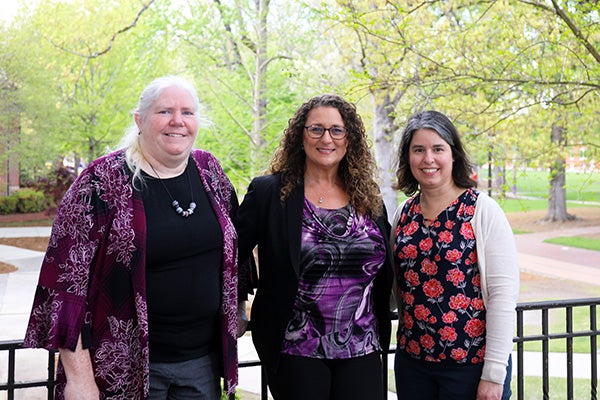Grant provides scholarships, microcredentials to future teachers
Three East Carolina University faculty members have been awarded a National Science Foundation (NSF) grant to address the shortage of secondary math and science teachers, especially in rural, high-need school districts, and investigate the use of microcredentials in teacher education.
The $1.4 million grant is part of the NSF’s Robert Noyce Teacher Scholarship Program, named after the famous physicist who advocated for improving public education in mathematics and science. Over five years, the grant will support 30 scholarships for ECU students to earn a degree and teacher licensure in mathematics or science.

Charity Cayton, center, is the lead researcher on a grant that will provide scholarships for future math and science teachers. Maureen Grady, left, and Heather Vance-Chalcraft are her co-investigators. (ECU photo by Kristen Martin)
“The ECU Noyce Scholars program serves the critical needs of our rural partner districts in math and science education,” said Holly Fales, the assistant dean of undergraduate affairs and educator preparation in the College of Education. “This program represents the commitment that the ECU educator preparation program has in producing high quality STEM educators and plays a vital role in our continued mission of regional transformation.”
Charity Cayton, associate professor of mathematics education and the grant’s principal investigator, will be joined in the research by Maureen Grady, a mathematics education associate professor, and Heather Vance-Chalcraft, an assistant professor in biology.
In addition to receiving a scholarship, Noyce Scholars will receive mentorship from previous scholars, and support and training for themselves and their mentors in rural, high-need schools. To recruit scholars, ECU will collaborate with Greene County Schools and Pitt County Schools. Partnerships with community colleges, such as Pitt Community College, are also integral to creating a model to recruit, support and retain transfer students as members of the program.
“The focus on preparing pre-service teachers for rural areas and strengthening ties to our community colleges in this grant also provides opportunities for recruiting and supporting future teachers from a more diverse pool of candidates and building a pipeline for new math and science teachers that can endure beyond the life of the grant,” Grady said.
ECU’s Noyce Scholars program is also partnering with the Rural Education Institute (REI) to give the scholars and their mentors the ability to earn three microcredentials that will better prepare them for meeting the needs of students in rural schools. These microcredentials will use virtual reality simulations to help educators strengthen their knowledge and self-efficacy in implementing culturally responsive teaching practices.
This is the third Noyce grant awarded to ECU. The first two grants produced 73 math and science teachers from 2009 to 2022.
“By the time this grant concludes, it represents over 15 years of sustained commitment to preparing excellent secondary math and science teachers to serve the needs of our region and beyond,” Cayton said.
As part of the scholarship, Noyce Scholars are required to teach in a high-need school district for one year for each year of funding received. Learn more about the program on the ECU Noyce Program website.